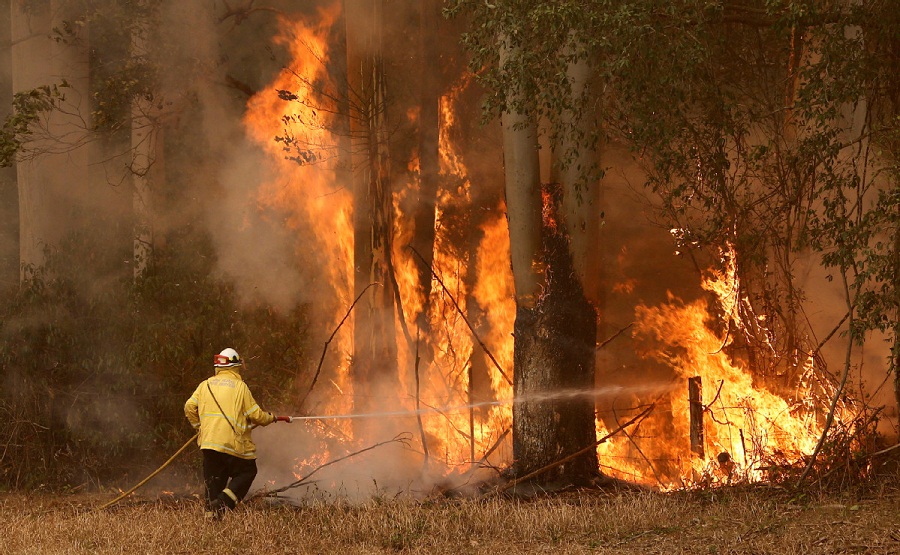Debates on climate intensified

By Karl Wilson in Sydney | China Daily| 2019 November 13 Wednesday
Australian PM among harshest critics of those linking blazes with global warming
What part has climate change played in the deadly wildfires that have ravaged California and the Amazon, and the bush fires now burning along Australia’s eastern coast? It is a question taking on greater significance as the intensity and frequency of fires increase.
Grant Wardell-Johnson, an adjunct associate professor with the School of Molecular and Life Sciences at Curt in University in Western Australia, said the link between climate change and fires’ impact is “complex but unequivocal”.
“Climate change causes more intense weather and the increasing likelihood of catastrophic fire conditions. Weather is the overriding factor affecting fire behavior under catastrophic conditions, when everything burns,” he said.
The government has declared a state of emergency in the state of New South Wales, where more than 1 million hectares of land have been burned and hundreds of homes destroyed in the past few months. In Queensland, one-third of that northern state has been designated in a state of emergency.
Around Australia, the debate over climate change and its impact on the environment is intensifying and polarizing the nation.
Australian Prime Minister Scott Morrison and his deputy Michael McCormack have been highly critical of those drawing a link between climate change and the current spate of bush fires.
McCormack has come in for the greatest criticism, due to his attacks on Australian Greens politicians and environmentalists in general.
On Monday he said remarks blaming climate change for causing the fires were “the ravings of some pure enlightened and ‘woke’ capital city greenies”.
Scientists, however, have so far generally avoided getting involved in the political arguments. They say climate change does not create bush fires, but it can make them worse. Several factors contribute to bush fire risk, including temperature, fuel load, dryness, wind speed and humidity, they point out.
The recent string of devastating wildfires in California has caused billions of dollars of property in damage and displaced thousands from their communities.
Wildfires have gotten bigger and more destructive in the US state, with 10 of California’s worst fires occurring in the past decade alone, analysts say.
According to the US Fourth National Climate Assessment, climate change doubled the area of forest burned in the western US between 1984 and 2015.
The Australian Bureau of Meteorology has said “climate change is influencing the frequency and severity of dangerous bush fire conditions in Australia”.
“The long-term changes in Australia’s climate, identified by climate scientists as resulting from global warming, mean intense fires have become frequent, and they are now occurring in areas which were previously very low bush fire risk areas,” Jim McLennan, bush fire safety researcher and adjunct professor with the School of Psychology and Public Health at Melbourne’s La Trobe University, told China Daily.
He said over the previous five years or more, average temperatures across Australia have risen, and there have been more frequent very hot days, especially during summer months.
During the last two years, annual rainfalls have been well below long-term averages.
In addition, annual rainfall patterns have changed, leading to drought conditions in many parts of Australia.
The result is that soil moisture levels are low and vegetation is drier, McLennan said. “This means that bush fires are more frequent, the bush fire high-risk period is longer, and fires are more intense and thus more dangerous to life and property and harder for fire agencies to control.
“In my opinion it is quite sensible to view the present disastrous bush fire situation as resulting from climate change,” he added.
Mayors from fire-ravaged areas of northern New South Wales have said there is no doubt in their minds that the devastating blazes tearing through their communities are a result of climate change.
Carol Sparks, the mayor of Glen Innes, told the Australian Broadcasting Corporation that politicians need to believe the scientific evidence on climate change. “These fires are not a political thing,… it is a scientific fact that we are going through climate change,” she said.
The current rash of fires along the eastern Australian coast presents a “critical linkage” in understanding how climate change will transform bush fire behavior, frequency and ecological impacts, said David Bowman, professor of Pyrogeography and Fire Science and director of the Fire Centre Research Hub in the School of Natural Sciences at the University of Tasmania.
“What I mean is, we are clearly transiting away from the stage of ‘what climate models tell us’ about the possible effects of climate change on bush fires to ‘observing and experiencing’ extreme, unusual, and ecologically and economically damaging bush fires driven by anomalous climate conditions,” Bowman said.
He said a much larger and more informed discussion about bush fire adaptation is needed, grounded in scientific reality. “As a society we are running out of time to adapt to climate-change-driven bush fires, and policy failure will lead to escalating disasters that have the capacity to eclipse the worst disasters we have experienced.”










